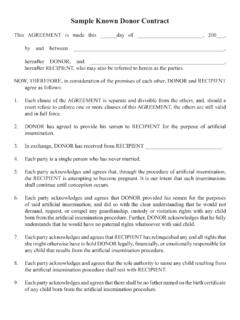

Journal of Fertility Counselling, 9(3), 14-20. Missing links: Identity issues of donor-conceived people. Interests, obligations, and rights in the gamete donation: a committee opinion. DOI: 10.1016/j.fertnstert.2013.11.007Įthics Committee of the American Society for Reproductive Medicine. "Misconduct in third-party assisted reproduction: a committee opinion." Fertil Steril.

DOI: 10.1016/j.rbms.2015.10.001Įthics Committee of the American Society for Reproductive Medicine. "Emerging models for facilitating contact between people genetically related through donor conception." Reprod Biomed Soc Online. Not having any way to pass on that information could be harmful.Ĭrawshaw M1, Daniels K2, Adams D3, Bourne K4, van Hooff JAP5, Kramer W6, Pasch L7, Thorn P8. Also, it can happen that a donor-conceived child develops a health problem that the donor should know about. This means the donor-conceived child may have incomplete medical history available to them. The donor may have no way (or incentive) to share updated medical history with the family. Even if the donor provides a comprehensive and complete medical history at the time of donation, future medical problems can arise. Access to medical history updates can be essential.They aren’t looking to replace the parent or parents who raised them. Most of these kids (or adults) just want to learn more about where they came from. The stereotypical image of a donor-conceived child wanting the donor to be an “idealized” parent has been found to be untrue. Most donor-conceived children are not interested in making their donors “new” parents-they just want to know more about themselves.This is especially true with modern genetic technologies, since children may eventually be able to discover their true origins and then feel their parents had been dishonest. While it was once thought best to keep donor-conception a secret from children, the vast majority of experts believe that being honest with children is best. Most experts believe children should be told they are donor-conceived.This can even lead to anxiety and identity issues. They may wonder why they don’t look like anyone on their dad or mom’s side of the family. In cases where families try to keep the donor-conception a secret, research has found that some kids may grow up feeling like something is off. Some donor-conceived child may have a “sense” that something isn’t right.Many donor-conceived children are curious about their donor “family.” One study on donor-conceived adults-who had been conceived with sperm donors-found that while 90 percent had little to no information on their donor, about 76 percent wanted to be able to meet or at least obtain more information on their donor, 65 percent referred to their donor as their “biological father,” 80 percent have tried to search for the donor, and 88 percent want to find and meet their half-siblings from the donor.The complexity of children’s psychology and identity development was not fully appreciated and understood. However, we now know that many children can sense that “something isn’t right.” They may notice that they don’t look like their mom or dad, or they may just have this inner discomfort that they don’t fully belong to their parents. It was thought best for both donor-conceived children and adopted children that their true origins be kept secret. When third-party reproduction began, specifically with sperm donors, ideas about children were very different. No one really considered the feelings and needs of the donor-conceived child.

Keeping the sperm donation a secret was a way to protect the perceived threat to their masculinity.

Especially so for sperm donations, some intended fathers are ashamed that they couldn’t produce a child of their own. Intended parents sometimes worry that if the donor-conceived child could contact their donor, they may seek out and choose the donor There is also worry that a donor may attempt to make parental decisions over the child. Some donors have long held the fear that a child may one day show up at their doorstep and ask them to be a parental figure of sorts-not something a donor intended to sign up for in helping create a family for someone else. The donor doesn't have to worry about being sued later for child support.


 0 kommentar(er)
0 kommentar(er)
